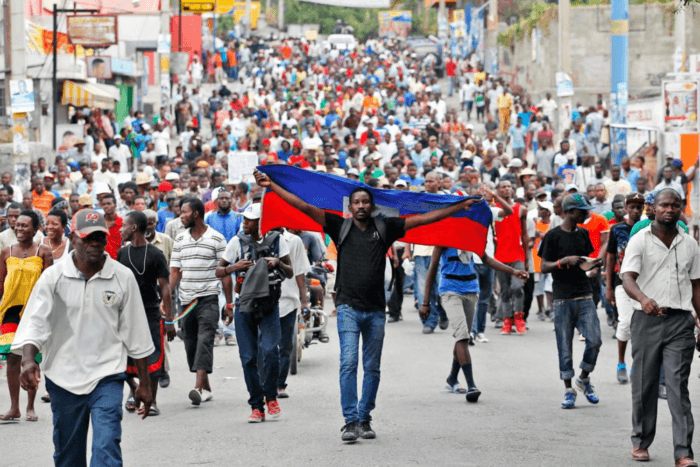
Jean Denis Saint-Félix, Regional Superior of the Jesuits in Haiti, shared his reflections on the current situation in the country, calling for urgent dialogue in the face of corruption and impunity. We invite you to listen to his voice, and the voice of the Haitian people, in their struggle for justice and peace.
“Immediate, concrete and effective measures must be taken to improve the living conditions of the population and to avoid the humanitarian catastrophe that awaits us from all sides. All efforts must be combined to provide access to clean water, medicines and basic needs.
The Executive, the Prime Minister, the Legislative Branch, the Judiciary, the Opposition Leaders, the Supporters of Anarchy and Violence, the famous International Community and more specifically the Core Group are all part of the problem and have contributed to increasing people’s misery and fueling their anger. They all support an aging, rotten and breathless system, unable to perform its functions of governing, administering, and are a real machine of inequality, neglect, impunity and corruption (the system gives no more of itself).
However, today, this crisis seems to offer us a golden opportunity that must be seized in a hurry to “shuffle the cards” of the Haitian nation. This time, there will be no superficial solutions, all made from afar and elaborated from some embassies, profitable only for the same small group of always corrupt politicians who only wait their turn to plunder the coffers of the state and enrich their clans and their families.
This is the hour of dialogue so demanded by all strata of Haitian society; impossible to escape from it. Such dialogue requires the participation of honest, competent and credible men and women. A dialogue that is called to defeat a system built on contempt for the poorest, inequality and injustice. This inclusive national dialogue – tout moun ladan, even the president – must inevitably lead us to another political regime that, as J. Tardieu says, goes through a new constitution, the establishment of republican institutions, a real economic reform and the Petro-Caribe trial.
This will not be enough due to economic asphyxia, which remains one of the essential elements of the crisis we are living through. Based on the analysis that was produced by the Jesuits last December, we have the right to say that the country will not change, that the living conditions of the masses will not change and the repeated crises will not stop if “the financial circuit and economic activity in general, especially the secondary and tertiary sectors, continue to be prisoners of a small monopolizing elite that opposes the emergence of a new class of local businessmen. This all-powerful elite that does not identify with the majority of the population, founded on corrupt practices, lacks any nationalist sentiment and invests very little in the country. The country will not change, the complaints, the historical anger of the population and the conflicts will not cease if the leaders and main economic agents “do not become aware and make a firm and sincere patriotic commitment that contributes to the effective construction of a more just, equitable and prosperous Haitian society.
The Haitian people, the popular majority, also have a role to play, their position as a victim does not suit them, and no longer corresponds to the gravity of their situation. They must become actors. Those who remain locked up and paralyzed at home must break the complicit silence and their position as spectators.
At this historic moment in the life of our people, the press must also live up to its true mission and its vocation of formation and information; while we recognize the commendable work of our journalists and many radio stations, we must also deplore the lack of professionalism and fanaticism that characterizes the work of a small number of communicators, and that tarnishes the image of our journalistic tradition, of which we are proud.
This is also where the true role of religious and academic leaders can be found. More than ever, as in the 1980s, we must leave our comfort and our silence – as Pope Francis says – to accompany the people in their struggle for total liberation. It is our duty, as religious and as intellectuals, to walk with them so that they cease to be manipulated by political mercenaries of all kinds. It is also our responsibility to transmit in national and international networks the scope, urgency and nobility of our struggle for justice and dignity. In doing so, we bear witness to our deep solidarity with the people in fidelity to the Gospel, whose plan is the salvation of humanity and all creation.
Finally, the Jesuits of Haiti in the coming hours will do our duty – even at the risk of our credibility – to contact our natural partners here and there, as well as other national sectors to think together and propose a space from which we could reflect on the real mechanisms of this much-needed dialogue.
We want to mobilize all our resources, both human and material, all our contacts and talents, both national and international, to pave the way for this dialogue, with a view to building this new society we dream of.
We would like to learn from and benefit from the experience of our Jesuit colleagues and universities that participated in similar processes in countries such as El Salvador and Colombia, to name but a few.
We count on the solidarity of the Conference of Jesuit Provincials of Latin America and the Caribbean – CPAL, of the Conference of Jesuits of Canada and the United States – JCCU, of the universal Society of Jesus, and with the participation of many men and women of good will who want to respond effectively to the mission of justice and reconciliation here and now.”
To read the full article (in Spanish), visit CPAL’s website.

